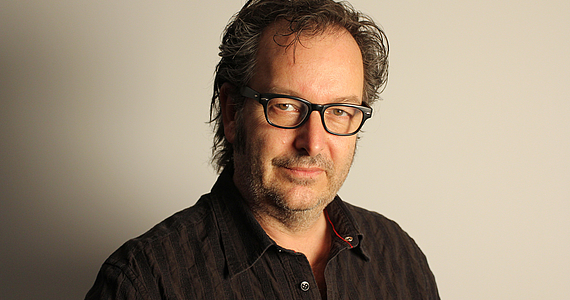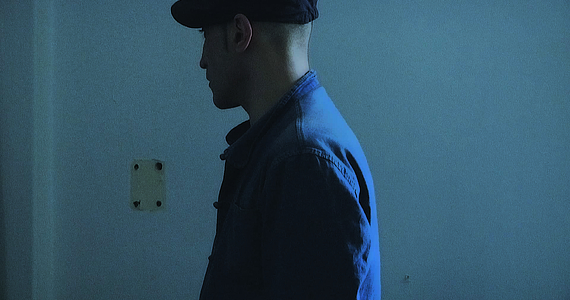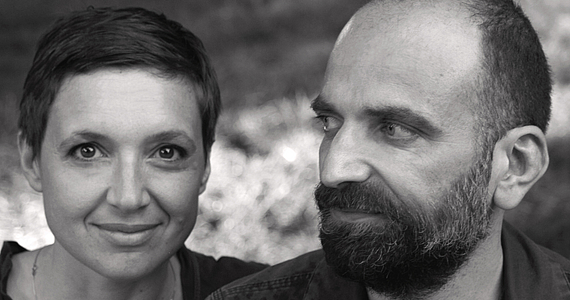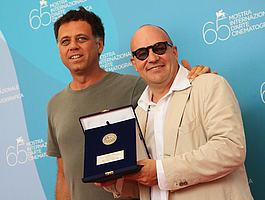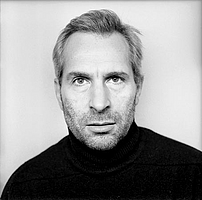Peter Mettler
Renowned director and cinematographer Peter Mettler profoundly influenced documentary writing in the 2000s. His hybrid work explores the limits of human perception without any predetermined script and according to an associative process that wanders about along the borders of essay, documentary and fiction.The director will give a masterclass online, while a retrospective will be dedicated to work on dafilms.com as well. All the information regarding these encounters, as well as the arrangements for participation, will be shortly available.
Born in Toronto in 1958 to Swiss parents, Peter Mettler studied film at the Ryerson Polytechnical Institute, and became a figure in the Toronto New Wave in the 1980s, by making a noteworthy first experimental feature, Scissere (1982), and as cinematographer for Atom Egoyan, Patricia Rozema and Bruce McDonald, as well as Jennifer Baichwal on Manufactured Landscapes (2006). The hybrid work of the filmmaker explores the limits of human perception without predetermined scripts and according to an associative process that wanders the borders of essay, documentary and fiction. His portfolio includes a trilogy of metaphysical documentary travelogues, consisting of Picture of Light (1994), Gambling, Gods and LSD (2002) and The End of Time (2012), and films haunted by the current environmental crisis such as Petropolis: Aerial Perspectives on the Alberta Tar Sands (2009) and Becoming Animal (2018). A multi-disciplinary creator, Peter Mettler also works as a VJ with artists such as Fred Frith, Biosphere or Jeremy Narby and Franz Treichler. In 2016, he donated his personal archives to the Cinémathèque suisse and to the archives of the Toronto International Film Festival, the largest cinematographical collection in English-speaking Canada.
Filmography
• Becoming Animal, 2018
• Traces du Futur, 2014
• The End of Time, 2012
• Petropolis: Aerial Perspectives on the Alberta Tar Sands, 2009
• Away, 2007
• Gambling, Gods and LSD, 2002
• Balifilm, 1997
• Picture of Light, 1994
• Tectonic Plates, 1992
• The Top of His Head, 1989
• Eastern Avenue, 1985
• Scissere, 1982
• Gregory, 1981
• Lancalot Freely, 1980
Petra Costa
Nominated at this year's Oscars in the Best Documentary Feature category for her latest film The Edge of Democracy, Petra Costa will be at Visions du Réel to present her work as a director and producer during the first retrospective dedicated to her work. As part of this Atelier, partnered by the HEAD–Genève, she will also give a Masterclass during which the audience will have the opportunity to discuss with her.
The Brazilian filmmaker draws inspiration from her personal experience to evoke the divides and contradictions of a country faced with tumultuous current affairs. While Petra Costa is publicly attacked by Brazilian President Jair Bolsonaro for criticizing his government, the Festival is honoured to welcome a woman committed to democracy and freedom of expression.
In the work of Petra Costa, the personal and the political are inextricably linked. Her latest film, The Edge of Democracy (2019, produced by Netflix and nominated for the Oscars), constitutes the final part of a trilogy in which the director's biography confronts the eventful history of her country, Brazil. Her first short film, Undertow Eyes, explored the memories and stories of her grandparents, in a personal and existential tale of love and death. Screened at MoMA in 2010, it won the prize for Best Short Film at the Rio Film Festival, the London International Documentary Festival and the Cine Las Americas International Film Festival (Austin, USA). Elena, her first feature length film, was the most watched documentary in Brazil in 2013. A hybrid creation lying somewhere between a documentary, diary and feverish reverie, this film was acclaimed by critics all over the world. Among others, it won the prize for Best Documentary Feature at the Havana Film Festival (2013) and was nominated for Outstanding Achievement in Cinematography at the Cinema Eye Honors (2014). In 2015, with Lea Glob, Petra Costa co-directed Olmo and the Seagull, a captivating dive into the meandering thoughts of a young actress during her pregnancy, always delicately fluctuating between the codes of fiction and documentary.
The Atelier will also be an opportunity to present two films that she has produced with her production company Busca Vida Filmes: Babenco : Tell Me When I Die by Bárbara Paz (a prize-winner at the latest Venice Film Festival), and Ecstasy, by Moara Passoni (world premiere at this upcoming CPH:DOX 2020, Copenhagen International Documentary Film Festival). The director began her theatre training in Brazil aged 14. A graduate of the School of Dramatic Arts at the University of São Paulo, she also studied anthropology and has a Master's in Social Psychology.
Filmography:
As director:
• The Edge of Democracy, 2019
• Olmo and the Seagull, 2015
• Elena, 2012
• Undertow Eyes, 2009
As producer:
• Babenco: Tell Me When I Die, by Bárbara Paz, 2019
• Ecstasy, de Moara Passoni, 2020
Les Ateliers 2019
Tariq Teguia
The mapping fictions of Tariq Teguia: A political cinema of sensations
Born in Algiers in 1966, Tariq Teguia studied philosophy and photography before dedicating himself to filmmaking. Between 1992 and 2002, he directed four short films evoking the isolation of Algerian youth trapped in a territory beset by an underground war without a front line. Drawing attention at the Berlinale with La Clôture (2003), Tariq Teguia began directing, outside the traditional film industry circuit, a trilogy of “mapping” fictions: the first roams, like his characters haunted by the desire to flee to the North, a suburb of Algiers under construction (Rome plutôt que vous, 2006, Orrizonti Festival, Mostra Venice), whereas Inland (2008, also shown at the Venice Film Festival), re-anchors Algeria to its continent and looks to the South, the heart of the country, and Révolution Zendj (2013, Grand Prix at the Entrevues Belfort Festival), whose filming began just before “the Arab Spring”, puts it back into a wider space, the Mediterranean world, stirred up by new struggles for emancipation. Considered as one of the most important Algerian filmmakers of his generation, Tariq Teguia captures societies under construction in powerful films, in which he attempts to merge “form and substance, ideas and sensations”.
In collaboration with HEAD – Genève.
The Masterclass will be presented by Bertrand Bacqué (Professor for film history and aesthetics, HEAD) and Emmanuel Chicon (Visions du Réel Selection Committee).
Martina Parenti et Massimo D’Anolfi
Martina Parenti and Massimo D’Anolfi: architects of reality
Martina Parenti and Massimo D’Anolfi are more than a cutting-edge team of filmmakers with a crystal-clear vision about the world. They singlehandedly reshaped the notion of documentary while spearheading the new wave of Italian cinema of the Noughties. Parenti and D’Anolfi, also a couple in real life, boast an impressive body of work. Their films have been presented all over the world in festivals such as Mostra Venice and Locarno Festival. Their approach to storytelling and editing has been highlighted in films as diverse as The Castle and Dark Matter. Deeply poetical but also rigorously political in their work philosophy, Parenti and D’Anolfi created films that have been praised critically worldwide. Their work questions our relationship to space and society, refusing though to hand out easy answers. Having established a regular workflow, Parenti and D’Anolfi directed six feature-length documentaries in ten years and a short film, with each new work pushing their ambitions towards uncharted territories. Visions du Réel presents the first ever complete atelier-retrospective of Martina Parenti’s and Massimo D’Anolfi’s work. A truly unique opportunity to discover the beauty and mysteries of films that have redefined the notion of documentary filmmaking.
Robert Greene
Robert Greene, the reinvention of the North-American documentary
Robert Greene is one of the most outstanding and cutting-edge directors to emerge from the United States in the last ten years. His work has redefined the boundaries of the traditional documentary, challenging the notions of reality and fiction. His films have been shown and awarded in festivals all over the world (Berlinale, Sundance, etc). But it is also at Visions du Réel with the astonishing Kati With an I (2010) that Greene’s work began gathering momentum and international recognition. His following work has confirmed and shown an ever-growing quality, thus making Greene one of the most acute chroniclers of America’s complexities. An all-round talent, he is also a professional editor, working notably for Alex Ross Perry (Listen Up Philip, Queen of the Earth, Golden Exits). With an unparalleled cinematic flair and an articulate cinephilia to back up his projects and films, Greene’s œuvre is a consistent body of work that takes on America’s contradictions and mythologies. Hailing from Charlotte, North Carolina, Robert Greene is also a professor and an influential critic and writer.
The Atelier that Visions du Réel dedicates to Robert Greene’s work is the first full retrospective ever presented and will provide an opportunity for students, cinephiles and audiences alike to engage with some of the most innovative films produced in the United States in the past decade or so. Robert Greene will hold his Masterclass on Wednesday 18 April 2018, at 10:00.
Filmography
• Bisbee'17 (2017) 130'
• Kate Plays Christine (2016) 112'
• Actress (2014) 86'
• Fake It So Real (2011) 95'
• Goodbye Engineer (2011) 21'
• Kati With an I (2010) 86'
• Owning the Weather (2009) 93'
• Ghost Towns of Arizona (2006) 7'
• Sports (2005) 13'
• One Dead in Ohio (2004) 10'
• Six Videos About Tourism (2003) 13'
• Ye Are the Light of the World (Don't Stare Into the Sun) (2002) 10'
• Rehobeth Trilogy Part II (2001) 3'
Philip Scheffner
Philip Scheffner or the exploration of the folds of history
Philip Scheffner is born in 1966 in Homburg, Saarland, and lives in Berlin since 1986, where he works as an artist and filmmaker. A unique voice in contemporary German documentary filmmaking, Scheffner questions, throughout his work, the construction of "truths", whether these are media-based (Day of the Sparrow, Havarie), legal (Revision), historical or anthropological (The Halfmoon Files). Often starting from news items, his work puts his subjects into perspective in order to examine how they are reported to us. His filmmaking is also marked by a profoundly human process in which the protagonists are approached as equals. His feature-length films have been presented in the Forum section of the Berlinale, at the Yamagata Film Festival and at the Museum of the Moving Image in New York among others.
The Visions du Réel Masterclass will be given as a duo, with the German writer and filmmaker Merle Kröger, who, with Philip Scheffner, co-founded the pong production platform in Berlin. The Masterclass Philip Scheffner and Merle Kröger will be held on Thursday 19 April 2018, at 10:00.
Gianfranco Rosi
Gianfranco Rosi was born in 1964 in Asmara (then in Ethiopia, now in Eritrea). He moves to New York in 1985, where he later graduates from the New York University Film School. Following a trip to India, he produces and directs his first medium-length film, Boatman (1993), presented at several international festivals. In 2008, the filmmaker wins the Prix Horizons and Doc/it for his first feature film, Below Sea Level at the Venice Film Festival, and the Golden Lion in 2013 for Sacro GRA. The film thus becomes the first feature documentary to be its holder. In 2016, Rosi goes on to win the Golden Bear at the Berlin International Film Festival and is nominated both at the Oscars 2017 and the César 2017 for his documentary Fuocoammare.
These prizes are clearly a confirmation of a body of work that has successfully reached the eyes and hearts of the public all over the world. A prestigious guest, loyal to Visions du Réel: he came to Nyon in 2012 to present Sacro GRA, which was still at the project phase. El Sicario, Room 164 and Fuocoammare were screened in 2011 and 2016, respectively. Learn more >
Stéphane Breton
Stéphane Breton was born in 1959 in Paris. He lived several years in the mountains of New Guinea to do is job as an anthropologist. He found there barefoot people, armed with bows, whose language, humor, greed and disputes he has learned. From that he makes his first film, Eux et moi (2001), in which, watched by the ones he's watching, he endorses the role of the "good savage". See and be seen will become the thread of his next films shot in the streets of Paris (Le monde extérieur, 2007), in Kirghizstan (Un été silencieux, 2005), in New Mexico (La maison vide, 2008), or in the Siberian Russia (Quelques jours ensemble, 2012, and Les forêts sombres, 2014).
The French filmmaker Stéphane Breton made waves in visual anthropology in 2001, exploding the pseudo-neutrality of ethnographical observation with his film Eux et moi, shot with the Wodani people in New Guinea. Since this rebellious film, the trained philosopher has continually observed the specific way those in remote parts of the world experience the concept of time. His work is a profound reflection on the art of looking at others and, thus, at oneself. Learn more >
Les Ateliers 2016
Dominic Gagnon: le cinéaste du chaos
Réalisateur, artiste d’installation et de performance, Dominic Gagnon travaille à partir d’images issues principalement du web. Collages faits de vidéos insolites et d’images quotidiennes, il dresse par ce biais d’étranges portraits de société. Son travail l’a amené à s’interroger sur les problématiques contemporaines de la violence, de l’économie en déclin, des sans-abris, de l’identité ou encore du sadomasochisme.
Audrius Stonys : le cinéaste de l’invisible
Le travail d’Audrius Stonys prend la forme d’une quête ouvrant sur un imaginaire fait de fragilité et de poésie. Accidents de pellicule, caméra numérique ou 35mm, son travail interroge le geste même de filmer et la question de la représentation. Grand adepte de courts métrage, son cinéma est une prise de parole poétique et sociale passant par l’image.
Les Ateliers 2015
Vincent Dieutre: le cinéaste français de l’autofiction
Fils spirituel de Chantal Akerman, Marguerite Duras, Eustache et Pasolini – ou encore « frère » d'armes de Naomi Kawase ou de Pierre Huygue –, Vincent Dieutre est un cinéaste français de la parole qui creuse l'apparente banalité du visible. Chacune de ses œuvres est le free replay d'un voyage, vécu comme expérience de décentrement et de fragilité créatrice.
Harutyun Khachatryan, le poète nomade du cinéma arménien
Auteur d’une œuvre incontournable et insensible à la différenciation artificielle entre documentaire et fiction, Harutyun Khachatryan a replacé l’Arménie sur la carte de la cinéphilie contemporaine avec une douzaine de films. Avec ses films, il a réussi à renouveler le dialogue entre Histoire et geste cinématographique en inscrivant la diaspora arménienne dans le cadre de la dissolution de l’Union soviétique.Son regard, d’une richesse rare, imagine une nouvelle possibilité d’existence commune, entre tradition et modernité, nostalgie et futur; c’est ce qui fait l’originalité de son œuvre nomade, échappant à toute catégorisation esthétique.
Les Ateliers 2014
Ross McElwee: le personnage derrière la caméra
Ross McElwee est un paradoxe: si ses histoires sont profondément ancrées dans son Amérique natale, sa façon de raconter est à des lieues du cinéma américain classique. Ross McElwee, dont les films sont sélectionnés dans les plus grands festivals (Berlin, Cannes ou encore Venise), propose une nouvelle façon de penser l’acte de filmer: ne visant pas à l’universalité des films hollywoodiens, il assume la subjectivité de son regard, joue avec elle, à tel point que l’homme derrière la caméra devient un personnage à part entière. Connu avant tout pour ses films autobiographiques, il aime à mêler une dimension intime avec l’Histoire.
Pierre-Yves Vandeweerd: le réel sublimé par l’image
Pierre-Yves Vandeweerd s’empare du réel, se l’approprie et le transcende. Connu notamment pour Le Cercle des Noyés (2007) et Territoire Perdu (2011), ce réalisateur belge, anthropologue de formation, se plonge corps et âme dans les histoires qu’il raconte, se laissant porter parfois dans des directions insoupçonnées. Sa démarche commence avant tout par une observation intense, voire une immersion totale dans un univers. Il se poursuit par un travail esthétique fort qui sublime son propos et lui donne du sens au-delà de toute attente.
